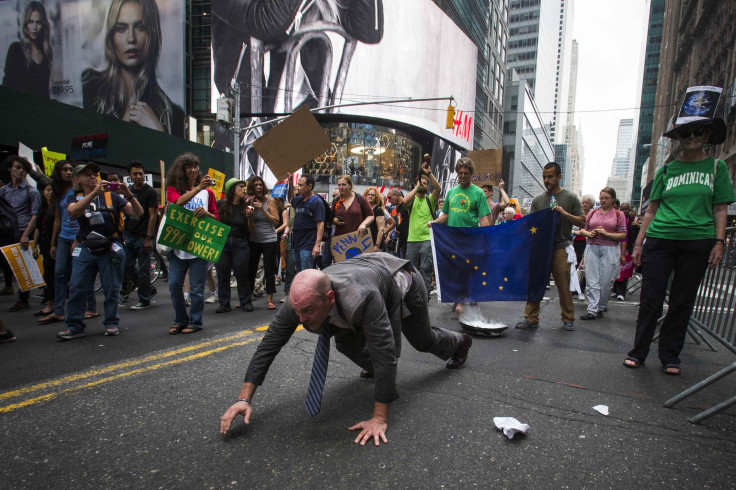UN Chief Ban Ki-Moon Says World Is Finally Awakening To Global Climate Change Threat

U.N. Secretary-General Ban Ki-moon used to feel like a one-man band, he says, beating the drums about the threat of global climate change while government leaders declined to take action. Now, the United Nations' top diplomat says the message may finally be sinking in.
Ban marched Sunday with some 400,000 people in New York City in the biggest climate demonstration in history. He'll be meeting Tuesday with about 125 presidents and prime ministers to discuss countries' climate strategies -- the largest gathering of its kind.
"I'm feeling a little bit at ease," he said Monday at the opening event of Climate Week NYC, an annual business forum to promote low-carbon investments, which also featured U.S. Secretary of State John Kerry.
Tuesday's U.N. summit will be the third convened by Ban since he became secretary-general eight years ago. Earlier summits in 2007 and 2009 pushed for a global treaty that could replace the Kyoto Protocol, which required countries to reduce greenhouse gas emissions. The protocol, which the U.S. never ratified, expired in 2012. Countries are now expected to hash out a new treaty at a formal U.N. climate conference in Paris in December 2015.
"More and more people understand that climate change is happening and approaching much, much faster than what they expect," Ban said. "That is affecting communities and economies around the world."
Meanwhile, the world's greenhouse gas emissions continue to grow. Last year emissions jumped by 2.3 percent to record levels, a report released Sunday said. Fossil fuel production in China, the United States and India spurred most of that growth.
At the Monday event, Ban urged business executives at the conference to spurn oil, coal and natural gas, and instead devote their resources and brain power to cleaner technologies.
"The actions that we take today can open the door to greater opportunity, prosperity and dignity for every person on this planet," he said. "If we cannot swim together, we will all sink."
Kerry similarly called for a massive shift away from fossil fuels and toward innovative technologies that can power homes, cars and buildings with solar, wind and other renewable resources.
"The energy economy of the future is a $6 trillion market," he said. "It doesn’t cost more to deal with climate change. It costs more to ignore it and to put our head in the sand and continue down this road of obfuscation and avoidance. And we need to make that clear to people in this country."
Kerry announced a $15 million grant to the World Bank, a U.N. financial institution, to help kick-start the organization's "carbon auction facility." The mechanism will encourage the operators of large livestock operations, landfills and waste treatment facilities to reduce emissions of methane -- a potent greenhouse gas -- by paying them for each ton of methane avoided.
The U.S. did not, however, enlist in a separate World Bank effort to call for a price on carbon dioxide emissions. The organization Monday announced a coalition of 73 countries, 11 regional governments and more than 1,000 companies and investors expressing support for either a carbon tax or a cap-and-trade emissions scheme, both of which would make it costlier to extract and burn fossil fuels. China, Russia and the European Union were among the top emitting countries. Together the coalition makes up more than half of the world's carbon emissions.
"The growing support is clear recognition that carbon pricing … is a necessary part of the solution to drive investment in a cleaner economy and the foundation on which other climate actions can build," Jim Yong Kim, president of the World Bank, said at Climate Week NYC.
"For those who didn't sign on: Why not? We know that this conversation has to happen. We know that unless we have tough, direct conversations we will not get where we need to be by Paris," he said.
© Copyright IBTimes 2024. All rights reserved.



















